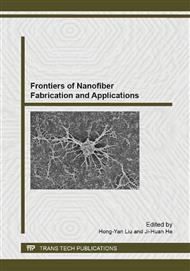p.70
p.74
p.78
p.82
p.86
p.92
p.97
p.102
p.106
Experimental Verification and Theoretical Analysis of Silk Dyeing and Finishing Functions with Modified Natural Tea Polyphenols Dye
Abstract:
The modification of natural dyes tea polyphenols is discussed in the silk dyeing. Tea polyphenols and 3-chlorine-2 - hydroxypropyl trimethyl ammonium chloride (CHPTMA) are ionized in alkaline condition, and modified tea polyphenols are prepared. The effect of CHPTMA modifier dosage, pH, temperature and time condition to modification of tea polyphenols are studied systematically. The optimal process of modification is obtained. The dyeing & finishing functional performances on silk were performed experimentally and verified theoretically.
Info:
Periodical:
Pages:
102-105
DOI:
Citation:
Online since:
November 2013
Authors:
Keywords:
Price:
Сopyright:
© 2014 Trans Tech Publications Ltd. All Rights Reserved
Share:
Citation:


